2006 年 12 月 24 日英语六级真题及答案
Part I Writing (30 minutes)
Directions: Forthispart,youareallowed30minutestowriteashortessayentitled
The Importance of Reading Classics. You should write at least 150 words
following the outline given below.
1. 阅读经典书籍对人的成长至关重要
2. 现在愿意阅读经典的人却越来越少,原因是…
3. 我们大学生应该怎么做
The Importance of Reading Classics
Part II Reading Comprehension (Skimming and Scanning) (15 minutes)
Directions: Inthispart,youwillhave15minutestogooverthepassagequicklyand
answer the questions on Answer Sheet 1.
For questions 1-4, mark
Y (for YES)
N (for NO)
ifthestatementagreeswiththeinformationgiveninthe
passage;
if statement contradicts the information given in the
passage;
NG (for NOT GIVEN)
if the information is not given in the passage.
Forquestions5-10,completethesentenceswiththeinformationgiveninthepassage.
Space Tourism
Make your reservations now. The space tourism industry is officially open for
business, and tickets are going for a mere $20 million for a one-week stay in space.
Despite reluctance from National Air and Space Administration (NASA),Russia made
American businessman Dennis Tito the world’s first space tourist. Tito flew into space
aboard a Russian Soyuz rocket that arrived at the International Space Station (ISS)
on April 30, 2001. The second space tourist, South African businessman Mark Shuttleworth,
took off aboard the Russian Soyuz on April 25, 2002, also bound for the ISS.
Lance Bass of ‘N Sync was supposed to be the third to make the $20 million trip,
but he did not join the three-man crew as they blasted off on October 30, 2002, due
to lack of payment. Probably the most incredible aspect of this proposed space tour
was that NASA approved of it.
These trips are the beginning of what could be a profitable 21st century industry.
There are already several space tourism companies planning to build suborbital vehicles
�
and orbital cities within the next two decades. These companies have invested millions,
believing that the space tourism industry is on the verge of taking off.
In 1997, NASA published a report concluding that selling trips into space to private
citizens could be worth billions of dollars. A Japanese report supports these findings,
and projects that space tourism could be a $10 billion per year industry within the
next two decades. The only obstacles to opening up space to tourists are the space
agencies, who are concerned with safety and the development of a reliable, reusable
launch vehicle.
Space Accommodations
Russia’s Mir space station was supposed to be the first destination for space
tourists. But in March 2001,the Russian Aerospace Agency brought Mir down into the
Pacific Ocean. As it turned out, bringing down Mir only temporarily delayed the first
tourist trip into space.
The Mir crash did cancel plans for a new reality-based game show from NBC, which
was going to be called Destination Mir. The Survivor-like TV show was scheduled to air
in fall 2001, Participants on the show were to go through training at Russia’s cosmonaut
(宇航员) training center, Star City. Each week, one of the participants would be
eliminated from the show, with the winner receiving a trip to the Mir space station.
The Mir crash has ruled out NBC’s space plans for now. NASA is against beginning space
tourism until the International Space Station is completed in 2006.
Russia is not alone in its interest in space tourism. There are several projects
underway to commercialize space travel. Here are a few of the groups that might take
tourists to space:
Space Island Group is going to build a ring-shaped, rotating “commercial space
infrastructure (基础结构)” that will resemble the Discovery spacecraft in the movie
“2001: A Space Odyssey.” Space Island says it will build its space city out of empty
NASA space-shuttle fuel tanks (to start, it should take around 12 or so), and place
it about 400 miles above Earth. The space city will rotate once per minute to create
a gravitational pull one-third as strong as Earth’s.
According to their vision statement. Space Adventures plans to “fly tens of
thousand of people in space over the next 10-15 years and beyond, around the moon, and
back, from spaceports both on Earth and in space, to and from private space stations,
and board dozen of different vehicles...”
Even Hilton Hotels has shown interest in the space tourism industry and
possibility of building or co-funding a space hotel. However, the company did say that
it believes such a space hotel is 15 to 20 years away.
Initially, space tourism will offer simple accommodations at best. For instance,
if the International Space Station is used as a tourist attraction, guests won’t find
the luxurious surroundings of a hotel room on Earth. It has been designed for conducting
research, not entertainment. However, the first generation of space hotels should offer
tourists a much more comfortable experience.
In regard to a concept for a space hotel initially planned by Space Island, such
�
a hotel could offer guests every convenience they might find at a hotel on Earth, and
some they might not. The small gravitational pull created by the rotating space city
would allow space-tourists and residents to walk around and function facilities would
be possible. Additionally, space tourists would even be able to take space walks.
Many of these companies believe that they have to offer an extremely enjoyable
experience in order for passengers to pay thousands, if not millions, of dollars to
ride into space. So will space create another separation between the haves and
have-nots?
The Most Expensive Vacation
Will space be an exotic retreat reserved for only the wealthy? Or will middle-class
folks have a chance to take their families to space? Make no mistake about it, going
to space will be the most expensive vacation you ever take. Prices right now are in
the tens of millions of dollars. Currently, the only vehicles that can take you into
space are the space shuttle and the Russian Soyuz, both of which are terribly inefficient.
Each spacecraft requires millions of pounds of fuel to take off into space, which makes
them expensive to launch. One pound of payload (有效载重) costs about $10,000 to put
into Earth’s orbit.
NASA and Lockheed Martin are currently developing a single-stage-to-orbit launch
space plane, called the VentureStar, that could be launched for about a tenth of what
the space shuttle costs to launch. If the VentureStar takes off, the number of people
who could afford to take a trip into space would move into the millions.
In 1998, a joint report from NASA and the Space Transportation Association stated
that improvements in technology could push fares for space travel as low as $50,000,
and possibly down to $20,000 or $10,000 a decade later. The report concluded that a
ticket price of $50,000, there could be 500,000 passengers flying into space each year.
While still leaving out many people, these prices would open up space to a tremendous
amount of traffic.
Since the beginning of the space race, the general public has said, “Isn’t that
great—when do I get to go?” Well, our chance might be closer than ever. Within the
next 20 years, space planes could be taking off for the Moon at the same frequency as
airplanes flying between New York and Los Angles.
注意:此部分试题请在答题卡 1 上作答。
1.
Lance Bass wasn’t able to go on a tour of space because of health problems.
2.
Several tourism companies believe space travel is going to be a new profitable
industry.
3.
The space agencies are reluctant to open up space to tourists.
4.
Two Australian billionaires have been placed on the waiting list for entering space
as private passengers.
�
5.
The price for the winner in the fall 2001 NBA TV game show would have been ________.
6.
Hilton Hotels believes it won’t be long before it is possible to build a ________.
7.
8.
9.
In order for space tourists to walk around and function normally, it is necessary
for the space city to create a ________.
What making going to space the most expensive vacation is the enormous cost involved
in ________.
Each year 500,000 space tourists could be flying into space if ticket prices could
be lowered to ________.
10. Within the next two decades, ________ could be as intercity air travel.
Part III Listening Comprehension (35 minutes)
Section A
Directions: In this section, you will hear 8 short conversations and 2 long
conversations.Attheendofeachconversation,oneormorequestionswill
beaskedaboutwhatsaid.Boththeconversationandthequestions willbe
spokenonlyonce.Aftereachquestiontherewillbeapause.Duringthepause,
youmustreadthefourchoicesmarkedA)B)C)andD),anddecidewhichis
thebestanswer.ThenmarkthecorrespondingletteronAnswerSheet2with
a single line through the centre.
注意:此部分试题请在答题卡 2 上作答。
11. A) Dr. Smith’s waiting room isn’t tidy.
B) Dr. Smith enjoys reading magazines.
C) Dr. Smith has left a good impression on her.
D) Dr. Smith may not be a good choice.
12. A) The man will rent the apartment when it is available.
B) The man made a bargain with the landlady over the rent.
C) The man insists on having a look at the apartment first.
D) The man is not fully satisfied with the apartment.
13. A) Packing up to go abroad.
B) Drawing up a plan for her English course.
C) Brushing up on her English.
D) Applying for a visa to the United Sates.
�
14. A) He is anxious to find a cure for his high blood pressure.
B) He doesn’t think high blood pressure is a problem for him.
C) He was not aware of his illness until diagnosed with it.
D) He did not take the symptoms of his illness seriously.
15. A) To investigate the cause of AIDS.
B) To raise money for AIDS patients.
C) To rally support for AIDS victims in Africa.
D) To draw attention to the spread of AIDS in Asia.
16. A) It has a very long history.
B) It is a private institution.
C) It was founded by Thomas Jefferson.
D) It stresses the comprehensive study of nature.
17. A) They can’t fit into the machine.
B) They have not been delivered yet.
C) They were sent to the wrong address.
D) They were found to be of the wrong type.
18. A) The food served in the cafeteria usually lacks variety.
B) The cafeteria sometimes provides rare food for the students.
C) The students find the service in the cafeteria satisfactory.
D) The cafeteria tries hard to cater to the students’ needs.
Questions 19 to 22 are based on the conversation you have just heard.
19. A) He picked up some apples in his yard.
B) He cut some branches off the apple tree.
C) He quarreled with his neighbor over the fence.
D) He cleaned up all the garbage in the woman’s yard.
20. A) Trim the apple trees in her yard.
B) Pick up the apples that fell in her yard.
C) Take the garbage to the curb for her.
D) Remove the branches from her yard.
21. A) File a lawsuit against the man.
B) Ask the man for compensation.
�
C) Have the man’s apple tree cut down.
D) Throw garbage into the man’s yard.
22. A) He was ready to make a concession.
B) He was not intimidated.
C) He was not prepared to go to court.
D) He was a bit concerned.
Questions 23 to 25 are based on the conversation you have just heard.
23. A) Bad weather.
B) Breakdown of the engines.
C) Human error.
D) Failure of the communications system.
24. A) Two thousand feet.
B) Twenty thousand feet.
C) Twelve thousand feet.
D) Twenty-two thousand feet.
25. A) Accurate communication is of utmost importance.
B) Pilots should be able to speak several foreign languages.
C) Air controllers should keep a close watch on the weather.
D) Cooperation between pilots and air controllers is essential.
Section B
Directions: Inthissection,youwillhear3shortpassages.Attheendofeachpassage,
you will hear some questions. Both the passage and the questions will be
spokenonlyonce.Afteryouhearaquestion,youmustchoosethebestanswer
from the four choice marked A) B) C) and D). Then mark the corresponding
letter on Answer Sheet 2 with a single line through the centre.
注意:此部分试题请在答题卡 2 上作答。
Questions 26 to 28 are based on the passage you have just heard.
Passage One
26. A) His father caught a serious disease.
B) His mother passed away.
C) His mother left him to marry a rich businessman.
�
D) His father took to drinking.
27. A) He disliked being disciplined.
B) He couldn’t pay his gambling debts.
C) He was expelled by the university.
D) He enjoyed working for a magazine.
28. A) His poems are heavily influenced by French writers.
B) His stories are mainly set in the State of Virginia.
C) His work difficult to read.
D) Hid language is not refined.
29. A) He grieved to death over the loss of his wife.
B) He committed suicide for unknown reasons.
C) He was shot dead at the age of 40.
D) He died of heavy drinking.
Questions 30 to 32 are based on the passage you have just heard.
Passage Two
30. A) Women.
B) Manual workers.
C) Prisoners.
D) School age children.
31. A) He taught his students how to pronounce the letters first.
B) He matched the letters with the sounds familiar to the learners.
C) He showed the learners how to combine the letters into simple words.
D) He divided the letters into groups according to the way they are written.
32. A) It can help people to become literate within a short time.
B) It was originally designed for teaching the English language.
C) It enables the learners to master a language within three months.
D) It is effective in teaching any alphabetical language to Brazilians.
Questions 33 to 35 are based on the passage you have just heard.
Passage Three
�
33. A) The crop’s blooming period is delayed.
B) The roots of crops are cut off.
C) The topsoil is seriously damaged.
D) The growth of weeds is accelerated.
34. A) It’s a new way of applying chemical fertilizer.
B) It’s an improved method of harvesting crops.
C) It’s an creative technique for saving labor.
D) It’s a farming process limiting the use of ploughs.
35. A) In areas with few weeds and unwanted plants.
B) In areas with a severs shortage of water.
C) In areas lacking in chemical fertilizer.
D) In areas dependent on imported food.
Section C
Directions: Inthissection,youwillhearapassagethreetimes.Whenthepassageis
readforthefirsttime,youshouldlistencarefullyforitsgeneralidea.
When thepassage is read forthe second time, you are requiredto fill in
theblanksnumberedfrom36to43withtheexactwordsyouhavejustheard.
For blanks numberedfrom 44 to 46 you arerequired to fillin the missing
information.Fortheseblanks,youcaneitherusetheexactwordsyouhave
justheard orwrite downthemain pointsin your ownwords. Finally,when
the passage is read for the third time, you should check what you have
written.
注意:此部分试题请在答题卡 2 上作答。
Adults are getting smarter about how smart babies are. Not long ago, researchers
learned that 4-day-olds could understand (36) ________ and subtraction. Now, British
research (37) ________ Graham Schafer has discovered that infants can learn words for
uncommon things long before they can speak. He found that 9-month-old infants could
be taught, through repeated show-and-tell, to (38) ________ the names of objects that
were foreign to them, a result that (39) ________ in some ways the received (40) ________
that, apart from learning to (41) ________ things common to their daily lives, children
don’t begin to build vocabulary until well into their second year. “It’s no (42)
________ that children learn words, but the words they tend to know are words linked
to
Schafer. “(44)
________________________________ with an unfamiliar voice giving instructions in an
unfamiliar setting.”
home,” explains
situations
in
the
(43)
________
Figuring out how humans acquire language may shed light on why some children learn
to read and write later than others, Schafer says, and could lead to better treatments
for developmental problems. (45) ________________________________. “Language is a
�
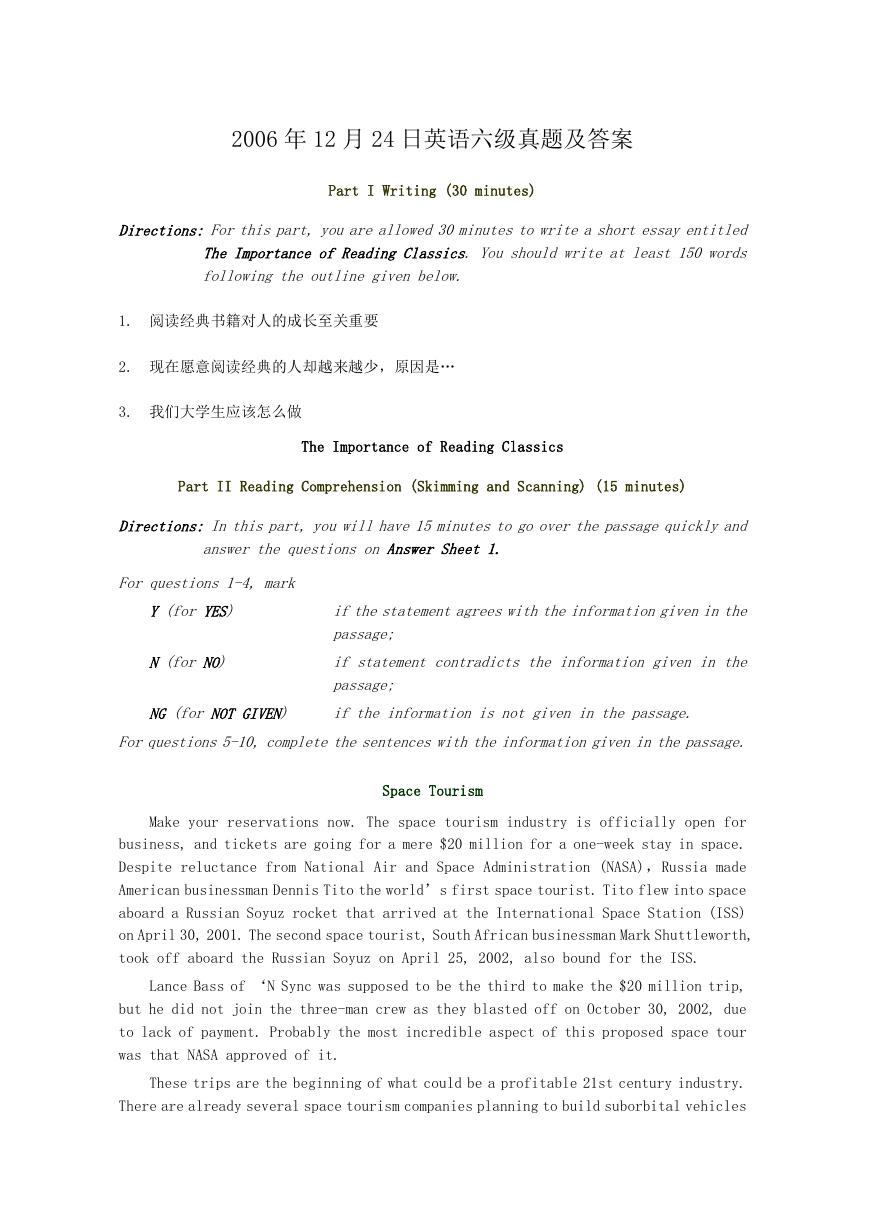
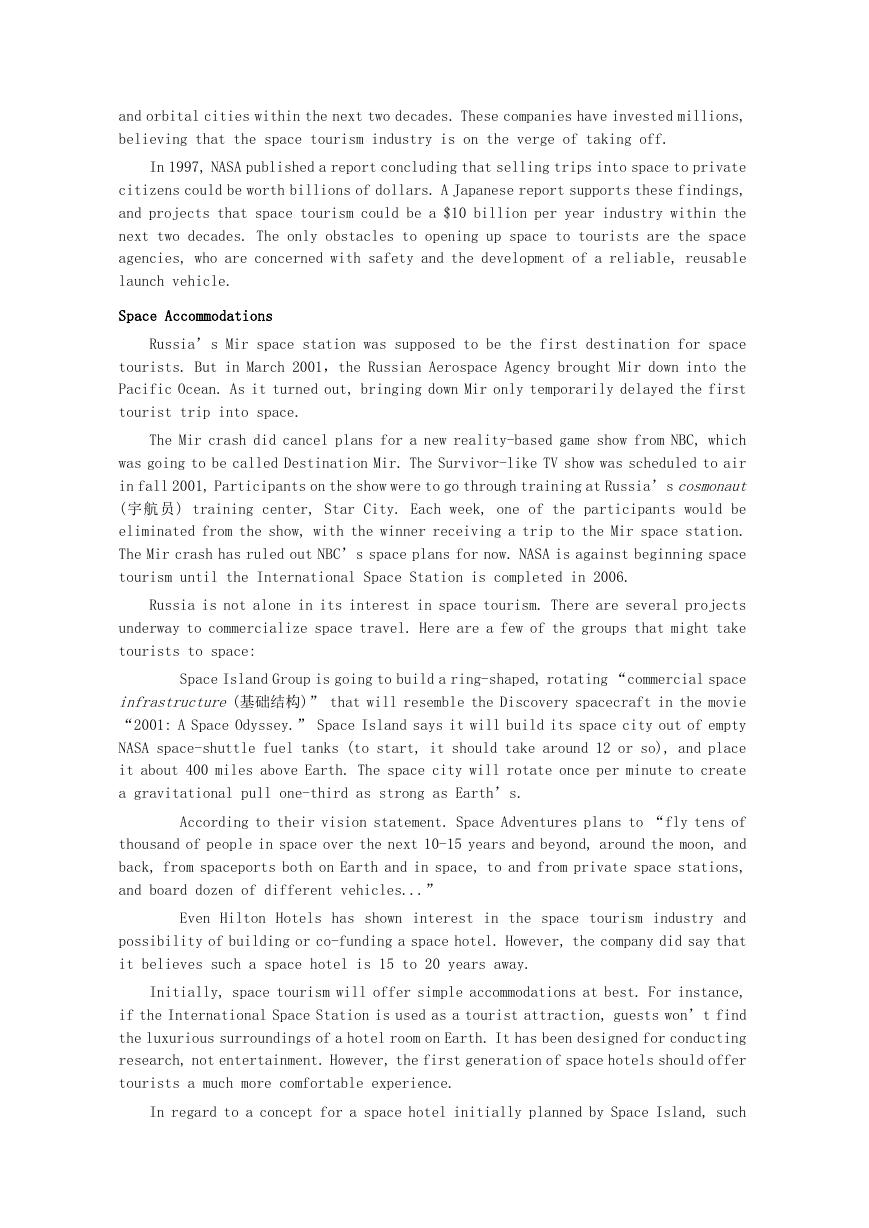
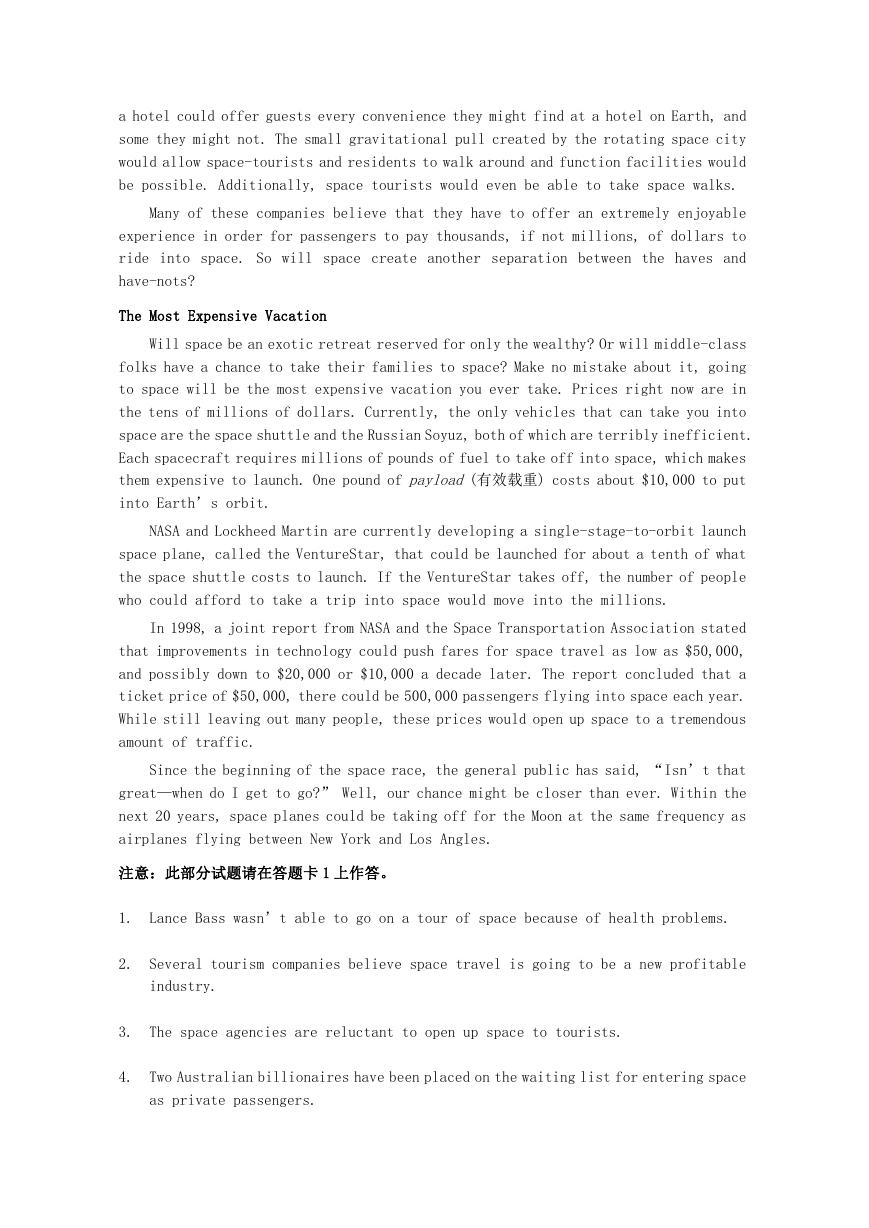
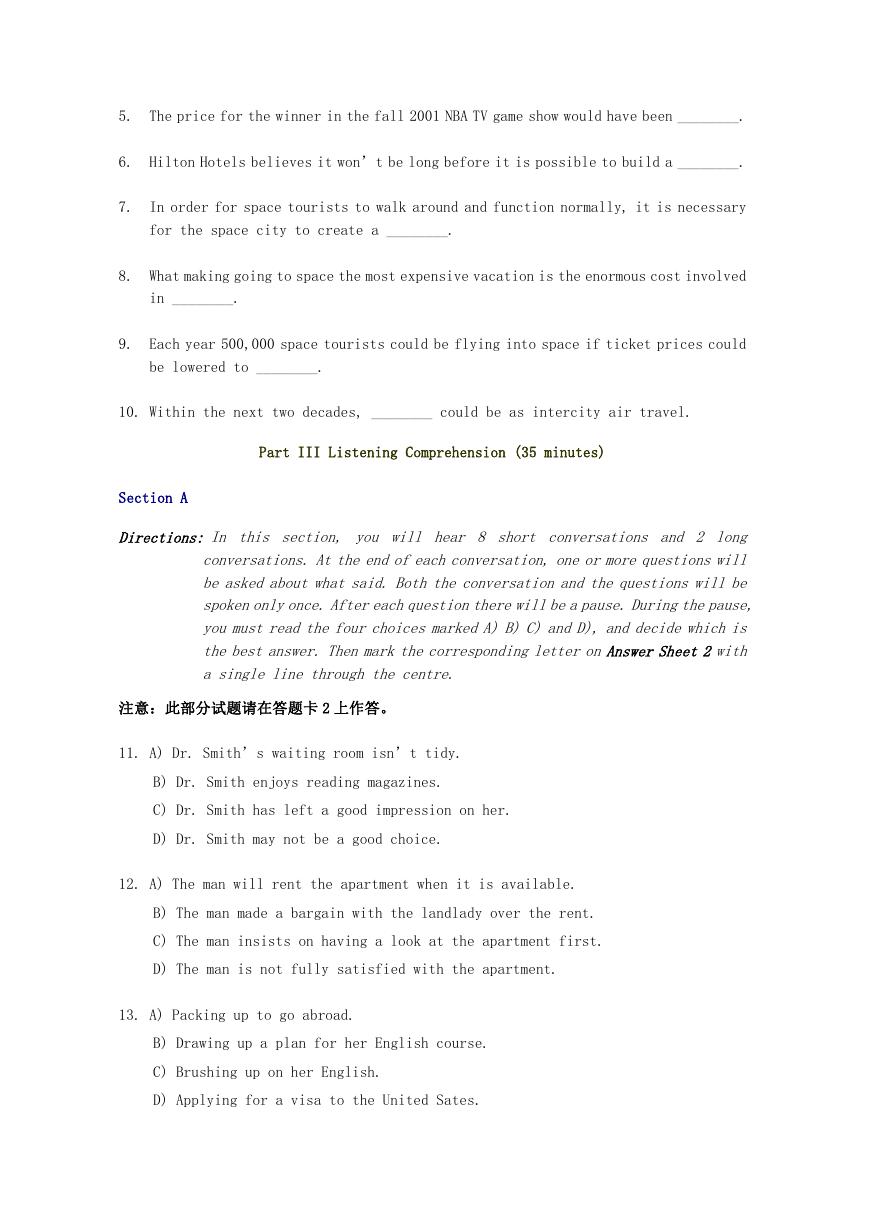

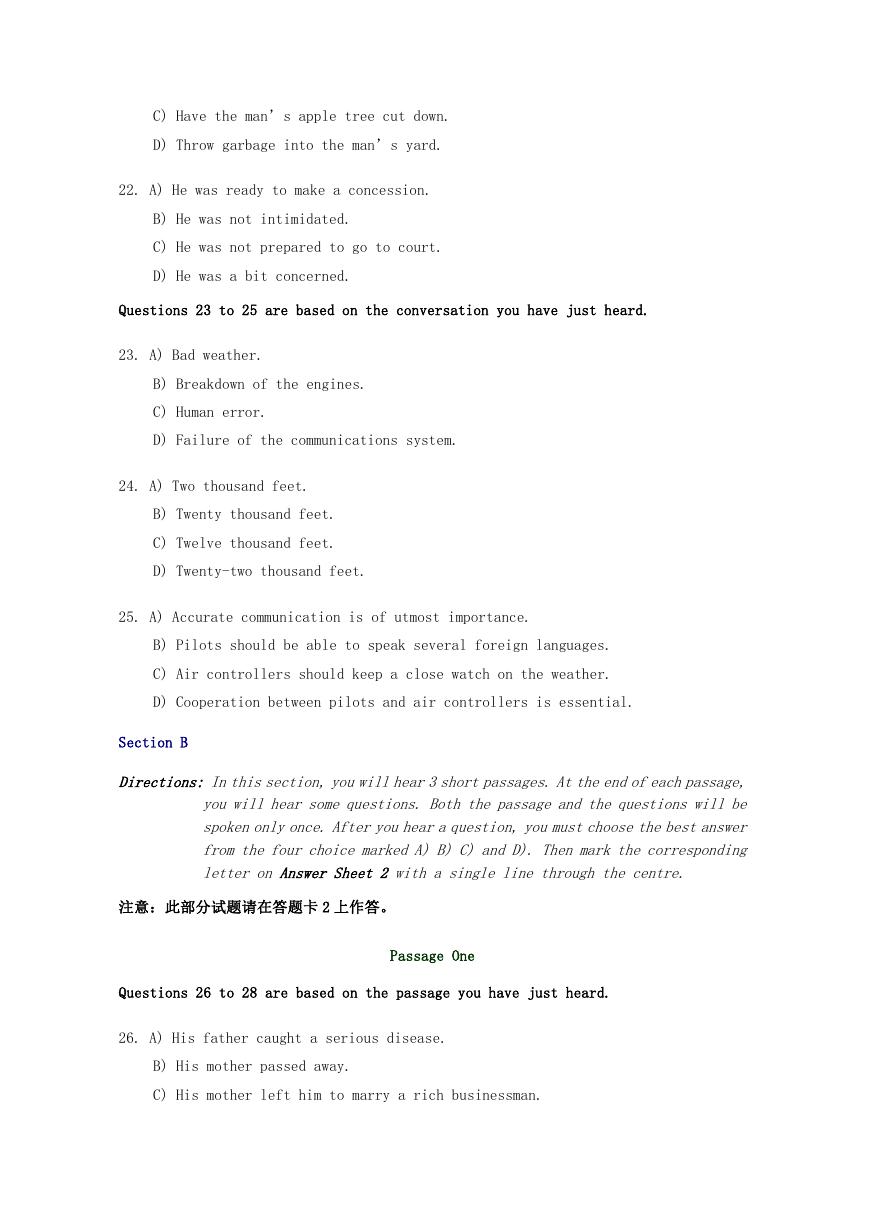
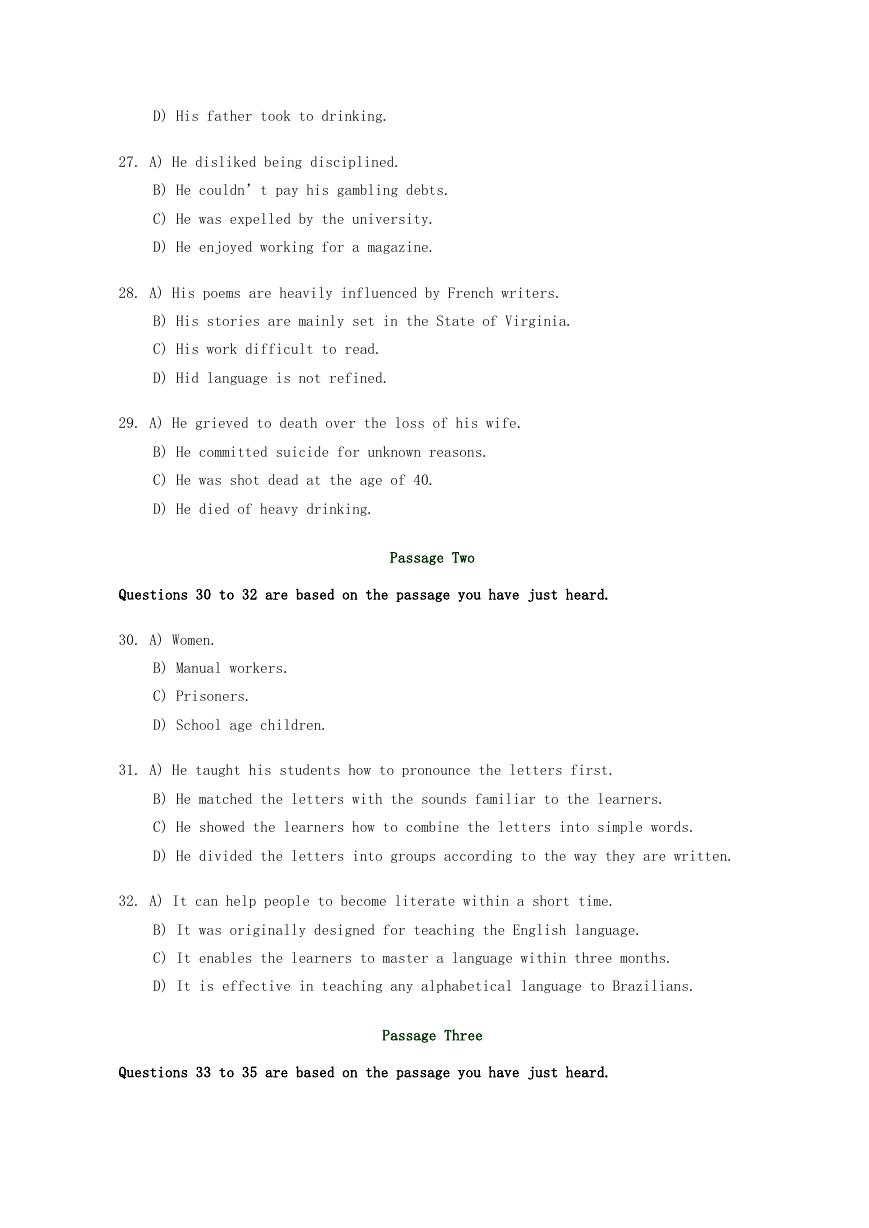
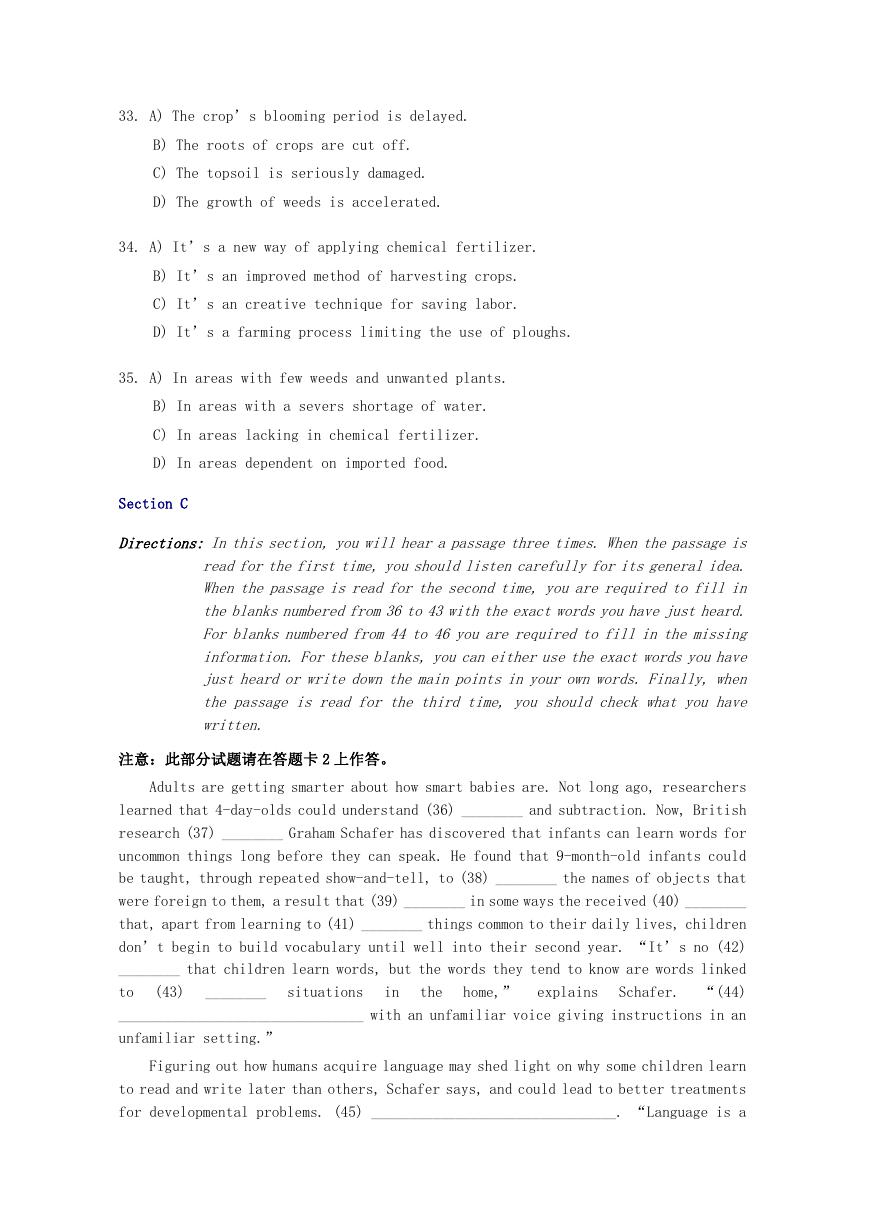








 2023年江西萍乡中考道德与法治真题及答案.doc
2023年江西萍乡中考道德与法治真题及答案.doc 2012年重庆南川中考生物真题及答案.doc
2012年重庆南川中考生物真题及答案.doc 2013年江西师范大学地理学综合及文艺理论基础考研真题.doc
2013年江西师范大学地理学综合及文艺理论基础考研真题.doc 2020年四川甘孜小升初语文真题及答案I卷.doc
2020年四川甘孜小升初语文真题及答案I卷.doc 2020年注册岩土工程师专业基础考试真题及答案.doc
2020年注册岩土工程师专业基础考试真题及答案.doc 2023-2024学年福建省厦门市九年级上学期数学月考试题及答案.doc
2023-2024学年福建省厦门市九年级上学期数学月考试题及答案.doc 2021-2022学年辽宁省沈阳市大东区九年级上学期语文期末试题及答案.doc
2021-2022学年辽宁省沈阳市大东区九年级上学期语文期末试题及答案.doc 2022-2023学年北京东城区初三第一学期物理期末试卷及答案.doc
2022-2023学年北京东城区初三第一学期物理期末试卷及答案.doc 2018上半年江西教师资格初中地理学科知识与教学能力真题及答案.doc
2018上半年江西教师资格初中地理学科知识与教学能力真题及答案.doc 2012年河北国家公务员申论考试真题及答案-省级.doc
2012年河北国家公务员申论考试真题及答案-省级.doc 2020-2021学年江苏省扬州市江都区邵樊片九年级上学期数学第一次质量检测试题及答案.doc
2020-2021学年江苏省扬州市江都区邵樊片九年级上学期数学第一次质量检测试题及答案.doc 2022下半年黑龙江教师资格证中学综合素质真题及答案.doc
2022下半年黑龙江教师资格证中学综合素质真题及答案.doc